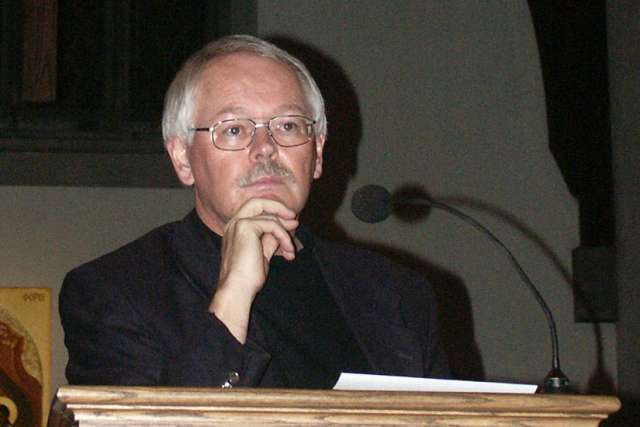Just because something is politically correct doesn’t mean that it might not also be correct. Sometimes we have to swallow hard to accept truth.
Faith without physical expression is not faith
By Fr. Scott Lewis, S.J24th Sunday in Ordinary Time (Year B) Sept. 13 (Isaiah 50:5-9; Psalm 116; James 2:14-18; Mark 8:27-35)
There is no shortage of individuals claiming to be agents and proclaimers of God’s will. Unfortunately, many of them represent nothing more than their own opinions, fears, prejudices and desires. Stripped of the cloak of God-talk, their words, thoughts and actions usually have little if anything to do with God. Often they divide or exclude people, stir up negative thoughts and emotions, and even end in violence that they believe is divinely sanctioned.
A eucharistic prayer over an awakening world
By Fr. Ron RolheiserWe too are covenanted to say Mass for the world
The alternative to change is the cross
By Mary Marrocco“Change is good!” So proclaimed a brightly smiling instructor to her dismayed class, who’d just learned their school was being moved to a different corner of the city. Somehow it didn’t feel quite as good as the neon smile and cheery voice pronounced it should.
God intends for us life, abundance, happiness
By Fr. Scott Lewis, S.J23rd Sunday in Ordinary Time (Year B) Sept. 6 (Isaiah 35:4-7; Psalm 146; James 2:1-5; Mark 7:31-37)
Do not fear! This call echoes throughout both the Old and New Testaments. It was often the greeting of an angel, intended to calm the fright of the person for whom they were bearing a message. It was uttered by Jesus on numerous occasions to pacify the terror of His followers — usually when He did something unusual, such as walking to them across the water. These were often the words of God, comforting the people after disaster and calamity and giving them hope for the future.
The healing place that is silence
By Fr. Ron RolheiserA recent book by Robyn Cadwallander, The Anchoress, tells the story of a young woman, Sarah, who chooses to shut herself off from the world and lives as an Anchoress (like Julian of Norwich). It’s not an easy life and she soon finds herself struggling with her choice. Her confessor is a young, inexperienced monk named Fr. Ranaulf. Their relationship isn’t easy. Ranaulf is a shy man, of few words, and so Sarah is often frustrated with him, wanting him to say more, to be more empathic and simply to be more present to her. They often argue, or, at least, Sarah tries to coax more words and sympathy out of Ranaulf. But whenever she does this he cuts short the visit and leaves.
We find God when we cleanse our hearts
By Fr. Scott Lewis, S.J22nd Sunday in Ordinary Time (Year B) Aug. 30 (Deuteronomy 4:1-2, 6-8; Psalm 15; James 1:17-18, 21-22, 27; Mark 7:1-8, 14-15, 21-23)
Obedience to rules and laws, especially those of a religious nature, is not popular with many people. Often there is a good reason — we lose sight of the logic behind them, or they fail to take real-life situations into account. They become an end in themselves rather than tools for something greater.
Feasting on the reality of Jesus
By Fr. Scott Lewis, S.J20th Sunday in Ordinary Time (Year B) Aug. 16 (Proverbs 9:16; Psalm 34; Ephesians 5:15-20; John 6:51-58)
What is wisdom? It is certainly not intelligence in the usual sense of the word, nor is it human cleverness. Quite the opposite: wisdom is the divine gift that flows from humility, simplicity of heart and thoughtful, prayerful, reflection on one’s life experience.
Jesus’ word is eternal life
By Fr. Scott Lewis, S.J21st Sunday in Ordinary Time (Year B) Aug. 23 (Joshua 24:1-2a, 15-17, 18b; Psalm 34; Ephesians 4:32-5:1-2, 21-32; John 6:53, 60-69)
The people of God had finally entered the Promised Land. Their 40 years of wandering in the wilderness was over and the dream of a new home had been fulfilled. Joshua, the successor to Moses, was growing old and not long for the Earth, so he gathered Israel together for a renewal of the covenant with God. He reminded them of all that God had done for them, and exhorted them to choose whom they wanted to serve.
Healing through positive growth in our hearts
By Fr. Ron RolheiserAll of us live with some wounds, bad habits, addictions and temperamental flaws that are so deeply engrained and long-standing that it seems like they are part of our genetic make-up. And so we tend to give into a certain quiet despair in terms of ever being healed of them.
Margaret taught us to give
By Mary MarroccoThe richness of a gentle August day was all round. A drive in the countryside featured lush fields ready or almost ready for harvest, with merry little breezes riffling through. Such a day will always make me think of Margaret O’Gara, for I heard the news of her Aug. 16 death during that country drive in 2012.












